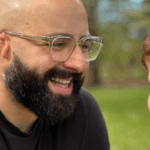MED-EL
Published Jan 14, 2015
3 Tips for Socializing as a Cochlear Implant Recipient

Editor’s note: Don Liveley is a recipient of bilateral cochlear implants. In his previous posts on The MED-EL Blog he talked about his childhood with hearing loss, and receiving his cochlear implants.
The physical disability of deafness is only a part of the equation of challenges we cochlear implant recipients face. The other part of the equation is the difficulties we face socializing, whether the cause comes from within or outside of our cocoon of silences.
I have watched many individuals receive hearing aids or cochlear implants who did not take steps to socialize, restore, and reclaim their social self and connections. Many simply laid down the hearing devices and re-entered their cocoons of silence. I continued to read about and see others who were frustrated with their hearing devices. I witnessed in their lives the same personal trauma I was experiencing.
My bilateral cochlear implantation helped to not only restore my hearing but also to restore my socialization capabilities. (Am I ever so grateful for this restoration!) But it wasn’t just receiving the cochlear implant that restored the social connections; it required hard and persistent work.
So, I wanted to share with you some of what has helped me.
Technology
Embrace technology. Recently one of the key developers of the Internet said that computers are getting smarter and people are getting dumber. Hey, that is a soap box I have no problem climbing on and proclaiming from. Audiologists I know share how much adults and parents of CI children are intimidated by technology.
If I said get over it I would be a hypocrite, as I have my own issues with technological phobia.
But learning to network and integrate with technologies like Bluetooth, telecom, and FM devices for personal use and for large venues is imperative. With the accessories, clarity improves and distance shrinks.
Teaching
Hearing folks generally have no clue what it’s like to have a hearing loss. How could they understand, if no one told them what it’s like? So the best folks to teach them are—us! But it has to be more of a mentoring effort and not a lecturing, hectoring, or formal teaching.
Individuals with disabilities are too often viewed as low performers in society and employment venues. Too often we give them cause to believe so. Sometimes we truly fulfill their low expectations of our relevance and capabilities. So don’t be ashamed. The embarrassment you feel is not often noticed by the majority of society. If you have setbacks, tragedies, failures, let them become a catalyst for learning and not for shame. Talk about them with your friends and grow together.
Rapport
If you have hearing loss, keep your personal space calm and anxiety-free. If you know someone with a hearing loss do what you can to keep their personal space calm and anxiety-free.
I once had some difficult and prolonged experiences with a person close to me. This person accused me of not “listening”. Why? They thought that the louder they talked or yelled, the better I would hear. But the opposite is true: the louder people yell the worse your speech discrimination becomes.
So build a rapport. Don’t be afraid to let others know the best ways to communicate with you. Let them know the importance of speaking clearly, of not yelling.
Thanks Don!
MED-EL
Was this article helpful?
Thanks for your feedback.
Sign up for newsletter below for more.
Thanks for your feedback.
Please leave your message below.
Thanks for your message. We will reply as soon as possible.
Send us a message
Field is required
John Doe
Field is required
name@mail.com
Field is required
What do you think?
MED-EL


